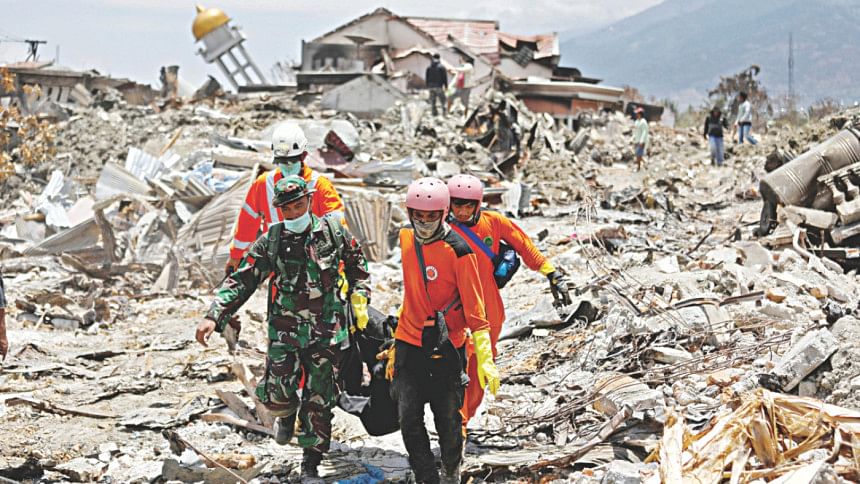Search ops winding down

-
Disease fears grow as more bodies found; toll reaches 1,649
More bodies were unearthed from the earthquake-and-tsunami-ravaged Indonesian city of Palu yesterday, as authorities move closer to calling off the search for the dead trapped under flattened communities and declaring them mass graves.
Officials yesterday said the death toll had climbed to 1,649 with more than a thousand feared still missing in the seaside city on Sulawesi island.
More than 82,000 military and civilian personnel, as well as volunteers, have descended on the devastated city, where relief groups say clean water and medical supplies are in short supply.
After days of delays, international aid has slowly begun trickling into the disaster zone where the UN says almost 200,000 people need humanitarian assistance.
But hopes of finding anyone alive a full eight days later have all but faded, as the search for survivors morphs into a grim gathering of the dead.
The search for survivors has not officially been called off.
But security minister Wiranto said the government had been discussing with local leaders and religious figures as to when the worst-hit areas would be declared mass graves, and left untouched.
"We have to make a decision as to when the search for the dead will end. Then, we later must decide when the area will be designated a mass grave," he told reporters late Friday.
Concerns are growing that decomposing bodies could pose a ticking time-bomb for public health.
Thousands of survivors continued to stream out of Palu to nearby cities in the aftermath of the disaster.
Hospitals remain overstretched and short on staff and supplies.
In Karawana village, nurse Iyong Lamatowa can offer little more than antibiotics and painkillers to treat those flocking to a makeshift clinic with badly-infected wounds.
Project HOPE, a medical NGO, said only two of its 82 staff in Palu had reported for duty since the quake.
The United Nations said Friday it was seeking $50.5 million "for immediate relief" to help victims.
Getting vital supplies to the affected areas has proved hugely challenging, with the number of flights able to land at Palu's small airport still limited, leaving aid workers facing gruelling overland journeys.
Oxfam had sent water treatment units and purification kits to Palu and Swiss aid teams on the ground were providing drinking water and emergency shelter, both said in statements Saturday.
Indonesia sits along the world's most tectonically active region, and its 260 million people are vulnerable to earthquakes, tsunamis and volcanic eruptions.

 For all latest news, follow The Daily Star's Google News channel.
For all latest news, follow The Daily Star's Google News channel. 




Comments